Celebrating Nine Years of Research in Education and Human Development
June 17, 2022
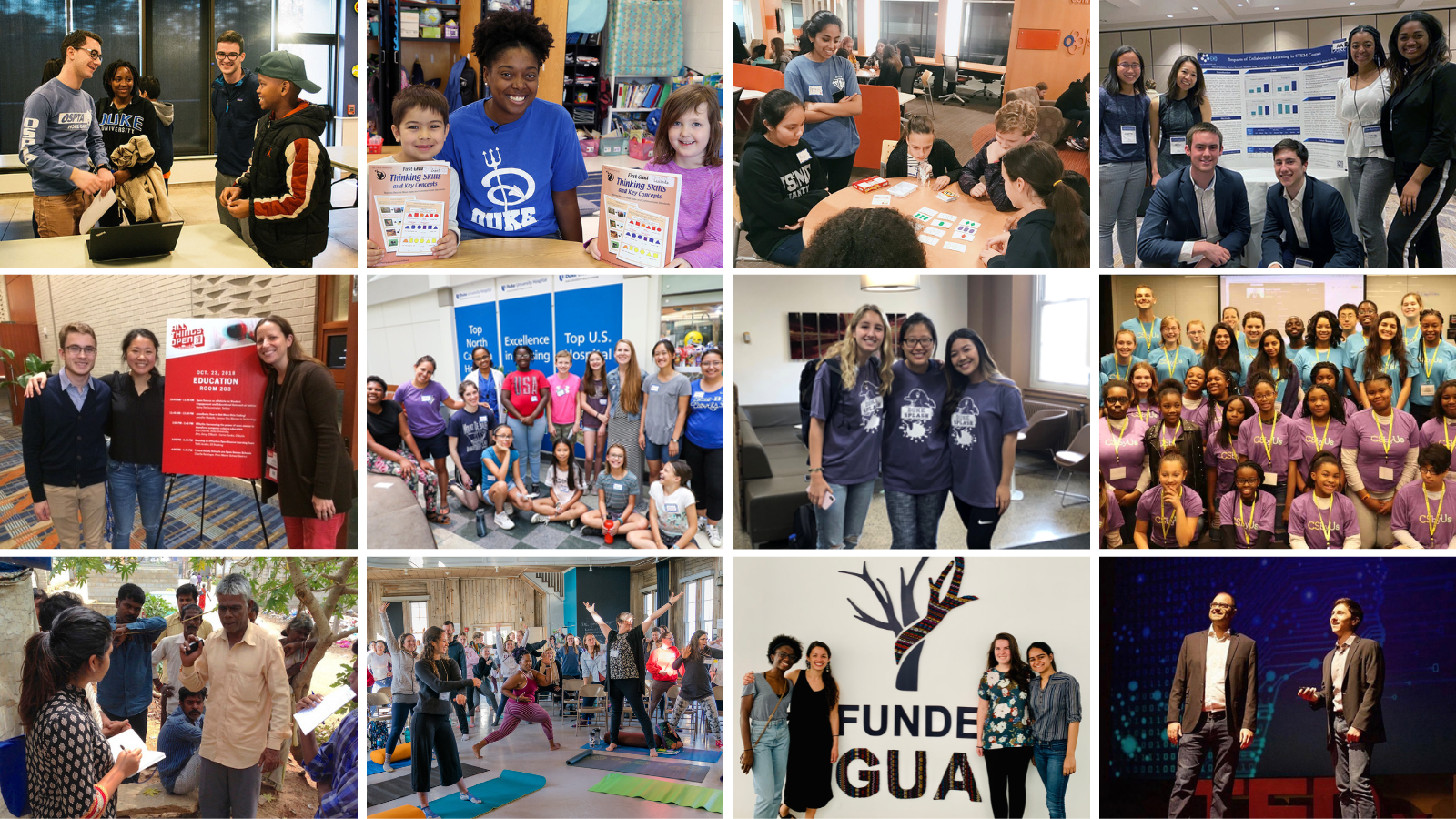
By Milena Ozernova ’22
Since 2013, the Education & Human Development theme of Bass Connections (EHD) has engaged students and faculty in interdisciplinary research exploring the range of factors contributing to positive life outcomes from personal and communal health to social and familial connections to income and employment to happiness.
Project teams in EHD have examined an array of topics including the effects of music therapy on children with autism; the health needs of refugee families in Durham; the impact of policy reforms on youth voter turnout; mental health interventions to support college student wellbeing; and the effect of education policy on social mobility in Brazil.
In 2022-2023, EHD — one of the program’s five original thematic areas — is being replaced by a new theme, Race & Society, which will investigate how race shapes society and lived experience. Race & Society is being administered by the Duke Social Science Research Institute and led by Tyson Brown (Sociology), and will support seven project teams in its inaugural year.
As we say goodbye to EHD after nine years, we want to celebrate and share the impact of this theme on the Duke community and beyond.
EHD’s Reach
Hosted by SSRI and led for the last five years by Anna Gassman-Pines (Public Policy), EHD has supported 121 project teams since the program’s inception.

These teams have included over 262 faculty/staff team leaders representing departments as diverse as economics, education, computer science, psychiatry, public policy, music and political science, as well as 650 students, 454 of whom are now alumni.
My research experience in education and human development through Bass Connections was immensely helpful in clarifying my post-Duke education and career plans. Through my experience with the Schooling and Parenting team, I gained skills in qualitative research methods, including interviewing participants and handling participant data, that I now use regularly [in my work]. –Jennifer Acosta ’17 (survey analyst, Mathematica; Ed.M. candidate, Harvard Graduate School of Education)
Of Bass Connections’ five original themes, EHD has the most teams that have engaged with external partners and worked directly with the Durham community.
EHD teams have collaborated with 139 external partners, including governmental organizations such as Durham Public Schools and Durham County Department of Social Services; nonprofits such as the East Durham Children’s Initiative and Voices Together; international organizations such as Church World Service and Federal Rural University of Rio de Janeiro; and private companies such as Apple and RedHat.
More than 50 EHD projects have engaged with research questions focused on the Durham area, while others have reached as far as Bangladesh, Brazil, Ghana, India and Uganda.
I am so proud of the work of the EHD teams over the last 9 years. These scholars, students, and community partners have not only helped to shape the science of human development but have generated insights with real-world implications for policy and practice. As the theme leader, it was thrilling to see students’ eyes opened to new ways of learning, colleagues’ research flourishing through team-based inquiry and local and global partners’ building their work through partnership. –Anna Gassman-Pines
What follows is a sampling of the outcomes and impact of the EHD theme.
Policy Recommendations to Improve Childhood Wellbeing in North Carolina
From 2019 through 2022, a project team led by faculty in the School of Medicine, the Sanford School of Public Policy and the Margolis Center for Health Policy examined innovative, evidence-based policy solutions to promote childhood flourishing in North Carolina.
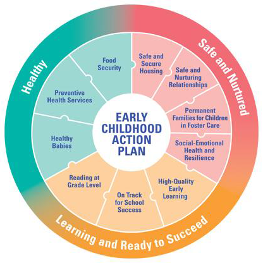
Focusing their research on key elements of the North Carolina Early Childhood Action Plan, this team partnered with the North Carolina Department of Health and Human Services, the Durham County Department of Social Services, the Partnership for Children, and North Carolina Integrated Care for Kids to examine the factors influencing children’s health and development.
Through a mixed methods approach that included dozens of expert and stakeholder interviews, survey data collection and analysis, and an ongoing analysis of the nationwide policy landscape around childhood wellbeing, the team identified best practices for social-emotional health screening and developed actionable policy recommendations to address key issues affecting childhood development, such as food insecurity and fair housing.
This team’s research was presented at conferences across the United States and provides the foundation for ongoing research in early childhood welfare being conducted by Duke students and faculty.

Recent graduates Ainsley Buck and Sophie Hurewitz received a 2021 Bass Connections Student Research Award to extend their team’s work. Focusing on the implementation of preventative health measures — a North Carolina Early Action Plan goal that their project team hadn’t yet tackled — the duo conducted seven focus groups with key informants to develop recommendations for equitable access to developmental screening for children across the state. Hurewitz wrote a graduation with distinction thesis based on this research.
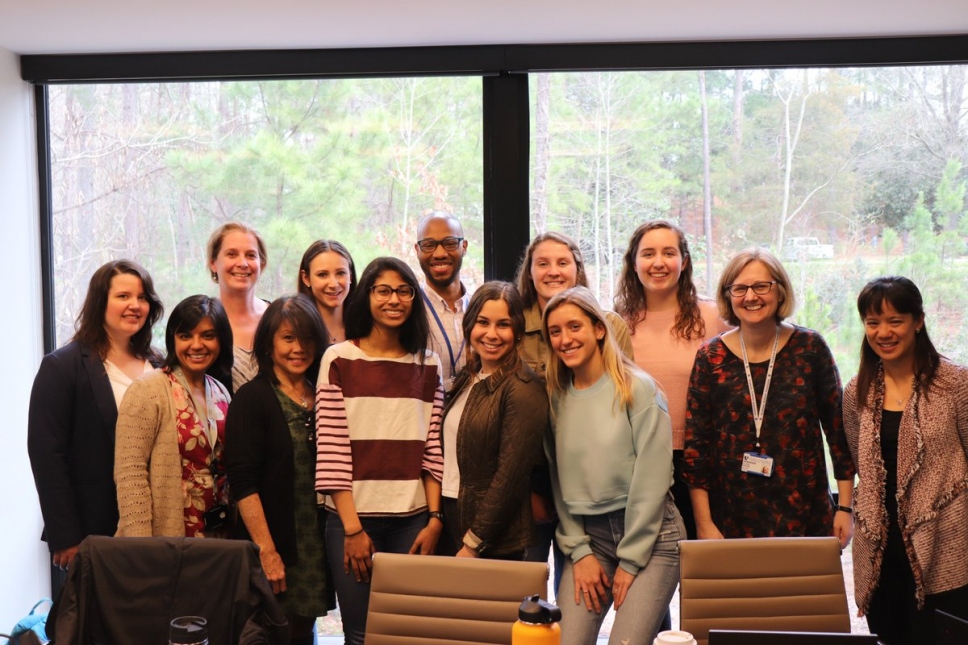
In August of our sophomore year, we attended our first North Carolina Early Childhood Action Plan team meeting. While we didn’t know it at the time, these meetings would go on to be not just a weekly occurrence for the duration of our college careers, but a source of newfound knowledge, incredible mentorship, networking opportunities and true friendship … We are both passionate about supporting the developmental and behavioral health of children and have dedicated our undergraduate careers to exploring how to optimize outcomes for children and families through medicine, psychology, research, education, policy and advocacy. –Ainsley Buck and Sophie Hurewitz
Fostering Social Mobility in Urban Brazil
Rio de Janeiro’s poor urban periphery — known as the Baixada Fluminense — has the country’s highest concentration of young people. The Cost of Opportunity project team, which ran from 2016 through 2019, collaborated with faculty, graduate students and undergraduates at the Federal Rural University of Rio de Janeiro to conduct research directed toward fostering social mobility in the region and encouraging the mandatory teaching of African and Afro-Brazilian history in high schools.
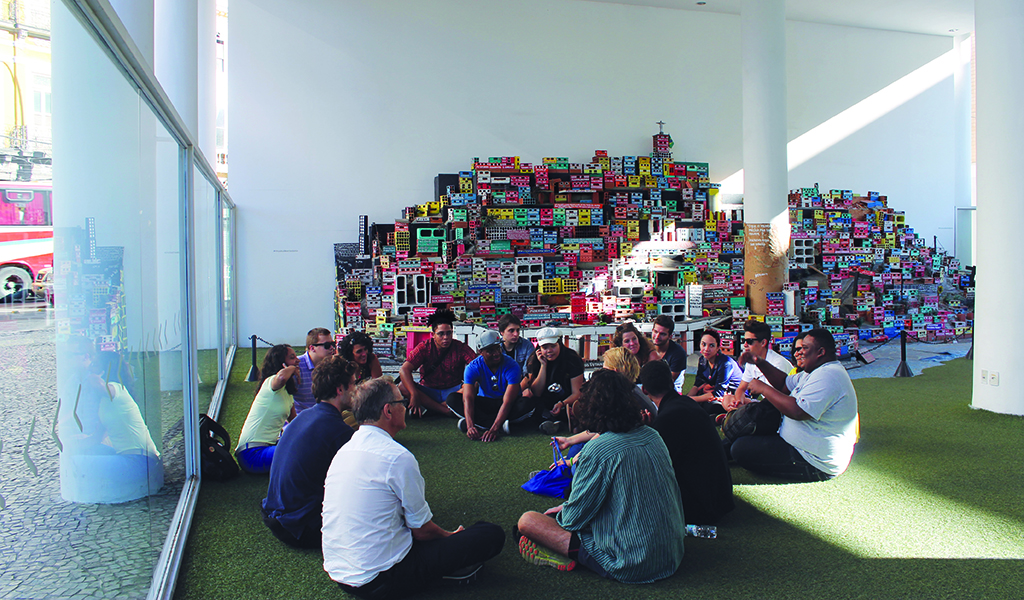
Ten of us visited and lived in Brazil for three weeks in 2016 and interviewed 50 students and faculty members at the Federal Rural University of Rio. We also filmed 10 hours of interviews and produced a 27-minute video designed to be watched by students, teachers and people in the community. The emphasis for the film was on the cost of pursuing opportunities on the part of these kids and their parents. This is the part of education that no one pays attention to, and it is an aspect of the project that Brazilian students have taken and turned into a movement in support of greater higher education access. –John French (faculty team leader)
Numerous undergraduate theses and doctoral dissertations built on the work of this project team, including that of Stephanie Reist (Ph.D. in Romance Studies ’18) who went on to complete postdoctoral research in the Education Department at the Federal University of Rio de Janeiro. Reist is now an instructor of Civic, Liberal and Global Education at Stanford University.
Strengthening Partnerships Between Durham Public Schools and Local Universities
Since 2019, students from Duke and North Carolina Central University have been researching the history of community schools, how they came to be in Durham and how the two universities can collaborate to meet the needs of the Durham Public Schools system. Team members have identified key challenges in the University-Assisted Community Schools model and revealed a need for more student training in the areas of equity, diversity and anti-racist education.

The collaboration between NCCU and Duke has been rewarding … This particular project does something that seems to be so obviously important for our community – bringing the two Durham institutions together to present unified support for Durham’s PreK-12 schools. —Yolanda Dunston (faculty team leader and professor of education, NCCU)
This project team will continue in 2022-2023 as part of the Race & Society theme with the goal of creating and piloting anti-racist curriculum modules to prepare university students to engage in public schools in Durham.
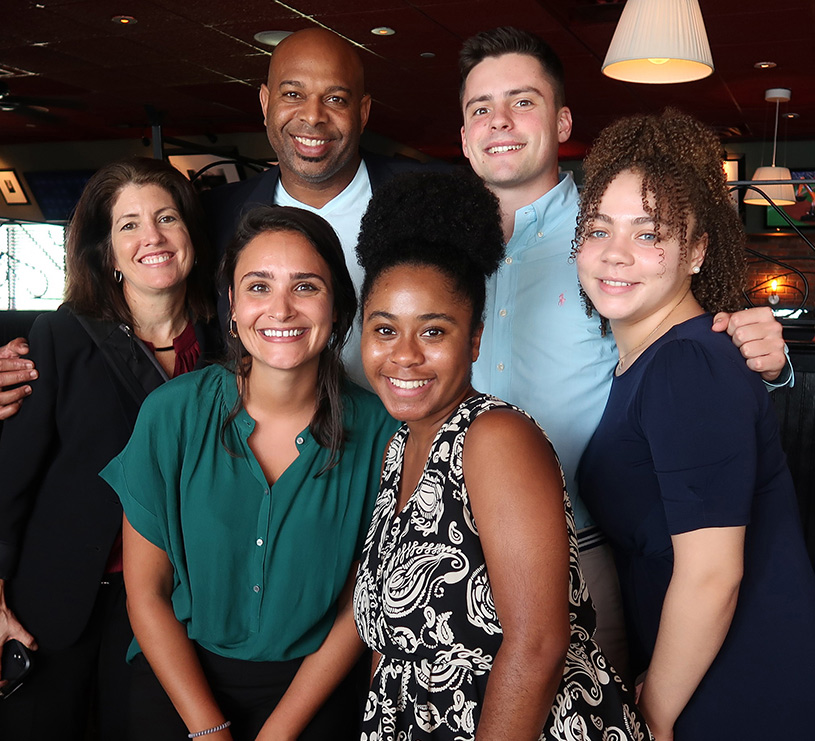
I take so much pride in my team, because I feel like we’re one of the first Bass Connections teams to interact with another school, especially a historically Black college or university. I find it amazing that we have those perspectives from NCCU … The cross-collaboration between the universities is one of the best things about the program, because I get to interact with students from a different university and get different perspectives. –Songia Wynn ’21 (undergraduate team member)
Increasing Student Literacy in Computer Science Across North Carolina
Since 2018, a Bass Connections team has been working to ensure that students in North Carolina have access to opportunities to learn computer science, with a particular focus on engaging female-identifying students and students of color who have traditionally been underrepresented in STEM fields. The project, CSbyUS, which is currently part of the Open Design Studio, has catalyzed a network of undergraduate mentors to develop and assess an open-source computer science (CS) curriculum to the meet the needs of elementary school and middle school students across North Carolina.
In 2019-2020, in partnership with #IAmCS – a campaign to make computer science education and careers accessible to all girls in North Carolina – the team worked with Mary Hemphill, director of Computer Science & Technology Education at the N.C. Department of Public Instruction, and the state of North Carolina to design a 15-hour open source computer science curriculum, consisting of 30-minute modules, for third, fourth and fifth graders.
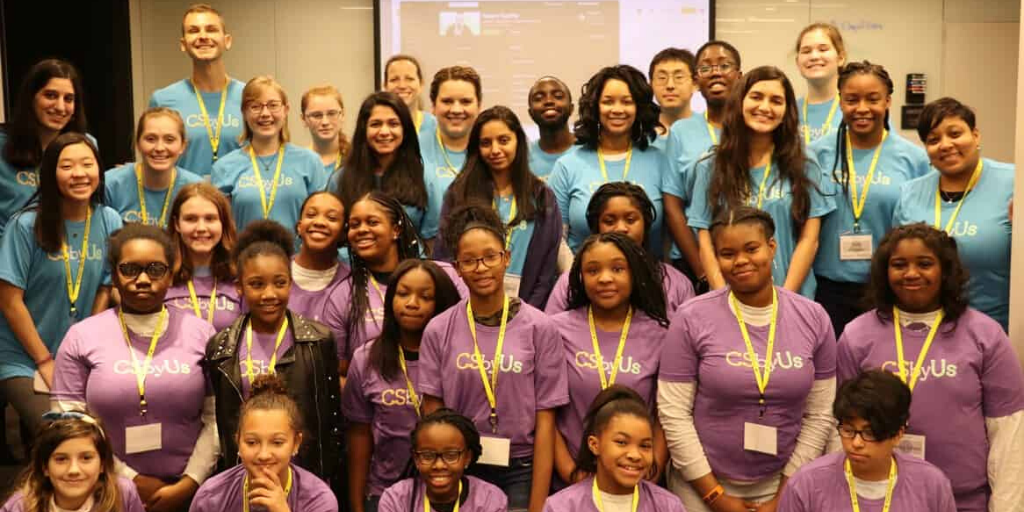
As the team awaits updates on the curriculum’s adoption, the Department of Public Instruction approved a proposal by the team leader Aria Chernik for an Open Design Academy that will help teachers and principals use open design to create equity-focused computer science curricula.
We have a rare and critical opportunity to reimagine education for all North Carolina students — including female students and students underrepresented in STEM fields — and to situate North Carolina as a national leader in future-proof learning … We want to be able to share not just our CSbyUs curriculum but also our mentor training with anyone who wants to do this … The real potential in this project is that anywhere there’s a college or university, you can have undergraduate mentors in their local communities using and iterating on this CSbyUs curriculum. –Aria Chernik (faculty team leader)
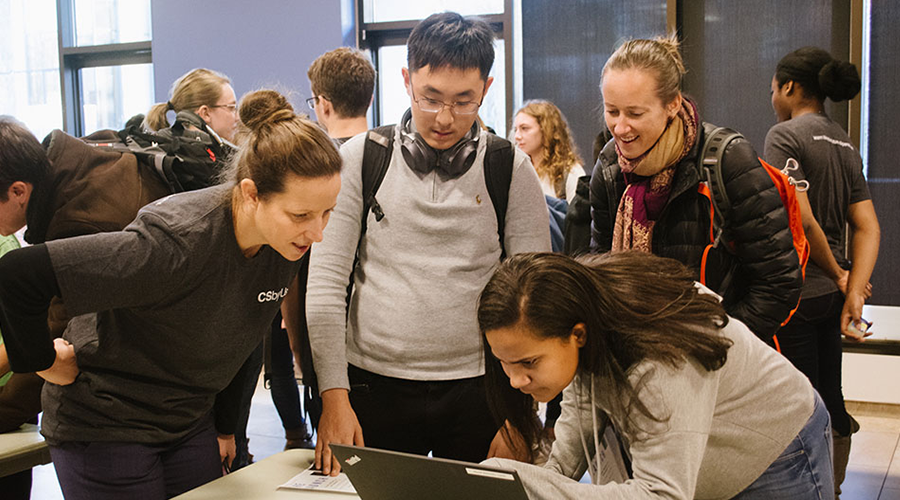
Chernik explained that open-source learning can be applied across disciplines, and although the current curriculum is tied to computer science, soon all teachers in the U.S. will be able to use these innovative pedagogy techniques.
I think it’s very important for those in the education/EdTech community to not give up on public education, and instead to work on improving education in the classroom, not out of it. I hope that our work with the N.C. Board of Education will provide a blueprint for how other education organizations (whether at the college or professional level) can work with their state government on the unified goal of helping our young students live better lives. –Jay Patel ’21 (undergraduate team member)
Expanding Latinx Representation in Health and STEM Careers
SALUD seeks to develop infrastructure for high school and college students in Durham to learn mentorship and leadership skills and receive professional development instruction in health technology, science, and college access. The program does this through a 12-session curriculum spanning an entire academic year that addresses social determinants of health through a social justice lens. From 2018-2021, this Bass Connections team has helped refine SALUD’s long- and short-term goals and developed a plan to assess the effectiveness of the curriculum and the program’s feasibility.
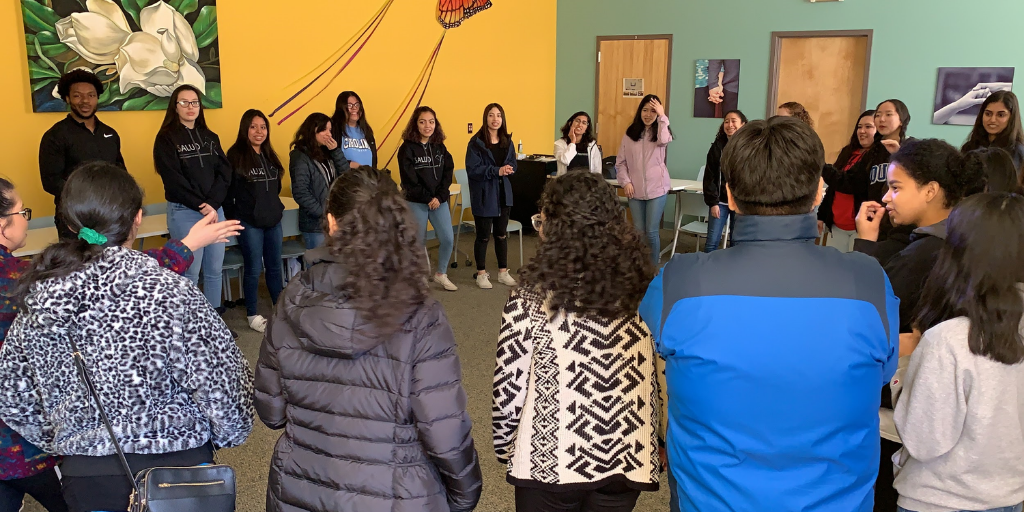
SALUD has been really successful in securing partnerships and funding to complete its mission … In 2019 alone, we had 13 community partners in eight departments within the university ... It means a lot to SALUD because it allows us to be a sustainable program and continue making impact not only for the Duke community, but also for the Durham community, and hopefully, elsewhere, as this model can be implemented in a variety of other communities. –Gaby Nagy (faculty team leader)
In addition to evaluating the SALUD curriculum, team members also created new sessions on racism in healthcare, sexual and reproductive justice, farmworker health and healthy relationships.
Social Science Meets Health Innovation in Hands-on Course
The EHD theme has also invited student to engage in interdisciplinary, project-based learning around education and human development topics through semester-long courses, such as the Social Science Research Lab.
Led by Jessica Sperling and conducted in partnership with the Social Science Research Lab, students in the course learn about topical issues related to healthcare administration and innovation and work in teams to develop research and evaluation proposals for “client” organizations such as the Duke Institute for Health Innovation.

Many students have been motivated to keep working on the collaborative projects after the course concludes, and the experience has been instrumental to several students’ decisions about their future academic and professional pathways.
For example, Zoe King, who is currently an M.S. candidate in Community Health and Prevention Research at Stanford University, noted that the course inspired her to design her own undergraduate major at Duke: Implementing Healthcare Innovation. King now works as an intern at Stanford Presence 5 for Racial Justice that aims to support equitable medical care and promote racial justice for Black patients.

[Our] project was focused on the implementation of a patient-reported outcomes questionnaire into the electronic health record in the Duke Cancer Institute … These experiences led me to want to dedicate my future studies at Duke to the study of implementation within healthcare — the methods to promote the uptake of research findings into real-world settings. –Zoe King (undergraduate team member)
Learn More
- Explore the interdisciplinary themes of Bass Connections.
- Learn how project teams work and consult our student FAQs.
- Browse stories from students about their Bass Connections experiences.
